
JOURNAL OF GLOBAL OPTIMIZATION
Scope & Guideline
Elevating Optimization Research to New Heights
Introduction
Aims and Scopes
- Global Optimization Algorithms:
The journal features research on various algorithms designed for solving global optimization problems, including deterministic and stochastic methods, heuristics, and metaheuristics. - Applications in Various Domains:
Papers often discuss applications of optimization techniques in fields such as engineering, economics, logistics, and environmental science, showcasing the practical relevance of theoretical advancements. - Theoretical Foundations:
The journal emphasizes the theoretical underpinnings of optimization, including duality, optimality conditions, and convergence theory. - Multi-objective Optimization:
Research frequently explores multi-objective optimization problems, addressing trade-offs between competing objectives and presenting novel scalarization methods. - Stochastic and Robust Optimization:
There is a consistent focus on stochastic optimization, addressing uncertainty in optimization problems, and robust optimization, which seeks solutions that remain effective under varying conditions. - Nonconvex Optimization:
The journal also covers nonconvex optimization problems, offering insights into challenges and methodologies for finding global optima in nonconvex landscapes. - Set-Valued and Vector Optimization:
Research on set-valued optimization and vector optimization problems is frequently published, contributing to the understanding of solutions that involve multiple criteria or sets.
Trending and Emerging
- Machine Learning and Optimization:
An increasing number of papers explore the intersection of machine learning and optimization, particularly in developing algorithms that enhance predictive modeling and decision-making processes. - Data-Driven Optimization:
Research focused on data-driven optimization techniques is on the rise, emphasizing the importance of utilizing large datasets to inform and improve optimization models and solutions. - Dynamic and Adaptive Optimization:
There is a growing trend towards dynamic and adaptive optimization approaches that respond to changing conditions and uncertainties in real-time. - Robust and Distributionally Robust Optimization:
Recent publications are increasingly addressing robust optimization and distributionally robust optimization, reflecting the need for solutions that perform well under uncertain data scenarios. - Hybrid Algorithms:
The development and application of hybrid algorithms that combine different optimization techniques are gaining prominence, allowing for improved performance across diverse problem sets. - Applications in Sustainable Development:
Research that applies optimization techniques to sustainability challenges, such as resource allocation and environmental management, is gaining traction, reflecting broader societal concerns.
Declining or Waning
- Traditional Linear Programming Techniques:
There is a noticeable decrease in papers focused solely on traditional linear programming methods, as newer, more complex optimization problems take precedence. - Basic Heuristic Approaches:
The journal has seen fewer contributions centered around basic heuristic approaches, as the field increasingly values sophisticated algorithms and hybrid methodologies. - Static Optimization Models:
Research on static optimization models has declined, likely due to a growing interest in dynamic and adaptive optimization frameworks that better reflect real-world complexities. - Single-objective Optimization:
The focus on single-objective optimization problems is waning, as multi-objective and multi-criteria optimization approaches gain more traction in addressing complex decision-making scenarios. - Simplistic Convex Optimization:
There is a reduction in the publication of simplistic convex optimization problems, as researchers are now more inclined to tackle nonconvex and mixed-integer problems that present greater challenges.
Similar Journals

JOURNAL OF COMPLEXITY
Pioneering Insights into Complex PhenomenaJOURNAL OF COMPLEXITY, published by Academic Press Inc. Elsevier Science, is a prestigious academic journal that has been at the forefront of advancements in the field of complexity science since its inception in 1985. With an ISSN of 0885-064X and an E-ISSN of 1090-2708, this journal is recognized for its impactful contributions across a range of mathematical disciplines, evidenced by its Q1 quartile rankings in Algebra and Number Theory, Applied Mathematics, Control and Optimization, Numerical Analysis, Statistics and Probability, and more. Positioned within the top echelons of Scopus rankings, it boasts notable standing—ranking #6 in Algebra and Number Theory and #25 in Numerical Analysis. Researchers, professionals, and students will find the journal's rigorously peer-reviewed articles invaluable for exploring the intricate relationships and phenomena that characterize complex systems. Although not an open-access journal, the insights offered are essential for expanding knowledge in mathematical frameworks and their applications in real-world problems. With a converged publication timeline extending to 2025, the journal is poised to continue shaping the discourse in complexity studies for years to come.
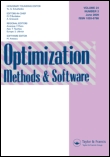
OPTIMIZATION METHODS & SOFTWARE
Elevating Software Development with Innovative Optimization StrategiesOPTIMIZATION METHODS & SOFTWARE, published by Taylor & Francis Ltd in the United Kingdom, is a premier journal dedicated to the field of optimization and software development. With an impressive impact factor, this journal maintains a critical role in advancing research in applied mathematics, control, and optimization, as evident from its categorization in the prestigious Q1 quartile for both applied mathematics and control and optimization, and Q2 in software for the year 2023. Over its publication span from 1992 to 2024, it has garnered significant recognition, ranking #116 out of 635 in applied mathematics and #29 out of 130 in control and optimization according to Scopus. The journal provides a platform for innovative research outcomes, theoretical advancements, and novel algorithms that aid researchers, professionals, and students in tackling complex optimization problems. Whether you are looking to disseminate your latest findings or explore cutting-edge methodologies, OPTIMIZATION METHODS & SOFTWARE remains an invaluable resource in the field.
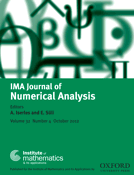
IMA JOURNAL OF NUMERICAL ANALYSIS
Transforming Ideas into Numerical SolutionsIMA Journal of Numerical Analysis, published by Oxford University Press, stands as a premier platform for cutting-edge research in the field of numerical analysis, exemplifying the latest advancements and methodologies in applied, computational, and general mathematics. Since its inception in 1981, this esteemed journal has continually contributed to the academic community by publishing high-quality, peer-reviewed articles that foster innovation and collaboration among researchers. With an impressive Q1 ranking across multiple categories, including Applied Mathematics and Computational Mathematics, it plays a crucial role in disseminating knowledge, as indicated by its Scopus rankings which place it in the top 25% of journals within its field. Although the journal is not open access, it remains a vital resource for academics, professionals, and students eager to engage with the ongoing evolution of numerical methods. By serving as a conduit for novel ideas and rigorous research, the IMA Journal of Numerical Analysis ensures that its contributors and readers are at the forefront of this dynamic discipline.

Bulletin of the South Ural State University Series-Mathematical Modelling Programming & Computer Software
Unlocking New Dimensions in Computational MathematicsThe Bulletin of the South Ural State University Series-Mathematical Modelling Programming & Computer Software is a distinguished academic journal focusing on the interdisciplinary fields of mathematical modeling, programming, and software development. Published by the SOUTH URAL STATE UNIVERSITY, SCIENTIFIC RESEARCH DEPARTMENT, this journal serves as a platform for the dissemination of innovative research findings, methodologies, and applications in computational mathematics and related disciplines. With its ISSN 2071-0216 and E-ISSN 2308-0256, it has garnered attention within the research community, reflected in its rankings within the Q4 quartile across multiple categories in 2023, including Computational Mathematics and Software. Although it operates under an open access model, the journal emphasizes the importance of high-quality, peer-reviewed content to advance research education and practice in the Russian Federation and beyond. Researchers, professionals, and students are encouraged to contribute and access valuable insights, fostering collaboration among disciplines spanning mathematical theory, computational methods, and software development.
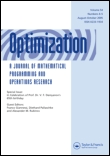
OPTIMIZATION
Fostering excellence in the study of optimization since 1985.OPTIMIZATION is a distinguished scholarly journal published by TAYLOR & FRANCIS LTD, catering to the vibrant fields of Applied Mathematics, Control and Optimization, and Management Science and Operations Research. With an ISSN of 0233-1934 and an E-ISSN of 1029-4945, this journal serves as a crucial platform for researchers, practitioners, and students alike, presenting cutting-edge research and innovative methodologies since its inception in 1985. With its current standing in the Q2 category across multiple fields as of 2023, OPTIMIZATION underscores its impact and relevance in the academic community, attracting high-quality contributions and fostering knowledge dissemination. Though it operates under a traditional access model, the journal ensures that its rigorous peer-reviewed content remains accessible to a wide audience, reflecting the latest advancements in optimization techniques and their applications in real-world scenarios. Whether you’re looking to deepen your understanding of optimization principles or apply these insights within your own research, OPTIMIZATION is an essential resource for advancing your knowledge and expertise in this dynamic field.
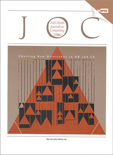
INFORMS JOURNAL ON COMPUTING
Transforming Ideas into Impactful SolutionsINFORMS JOURNAL ON COMPUTING, published by INFORMS, stands as a quintessential platform for disseminating cutting-edge research and innovative methodologies in the realms of computing, information systems, and operations research. Since its inception in 1996, this journal has consistently maintained a prestigious Q1 quartile ranking across multiple categories, including Computer Science Applications, Information Systems, and Management Science and Operations Research, reflecting its significant impact and relevance in the academic community. The journal serves as a vital resource for researchers, professionals, and students alike, fostering interdisciplinary dialogue and the advancement of theoretical and practical contributions in computing. With no open access restrictions, it remains accessible to those engaged in the pursuit of knowledge and innovation in a rapidly evolving field. Housed in the United States, the journal continues to thrive, enriching the discourse in technology and its applications until 2024 and beyond.

JOURNAL OF OPTIMIZATION THEORY AND APPLICATIONS
Leading the Charge in Theoretical and Practical AdvancementsJOURNAL OF OPTIMIZATION THEORY AND APPLICATIONS, published by Springer/Plenum Publishers, is a prestigious academic journal that has been at the forefront of the fields of applied mathematics, control and optimization, and management science since its inception in 1967. With an ISSN number of 0022-3239 and an E-ISSN of 1573-2878, it is recognized for its rigorous peer-reviewed content and aims to provide a platform for the dissemination of research that advances theoretical frameworks and practical applications in optimization. As of 2023, the journal holds an impressive Q1 ranking in both Applied Mathematics and Control and Optimization, showcasing its impact and influence in these domains. The journal is also highly ranked in the realm of management science and operations research, making it a vital resource for academics, professionals, and students alike. Though it does not currently offer open access, the journal's articles are widely accessible through institutional subscriptions. Significantly, its long-standing commitment to scholarly excellence positions it as a key player in fostering innovative research and discussions that impact various real-world challenges in optimization.

APPLIED MATHEMATICS AND OPTIMIZATION
Pioneering Applied Mathematics for Practical SolutionsApplied Mathematics and Optimization, published by Springer, is a prestigious journal dedicated to the rigorous exploration of applied mathematics, optimization techniques, and their multifaceted applications. Since its inception in 1974, the journal has maintained a robust reputation within the academic community, achieving a commendable Q1 ranking in both Applied Mathematics and Control and Optimization categories as of 2023. With an impact factor that underscores its influence in the field, the journal provides a platform for researchers and practitioners to disseminate innovative methodologies and significant advancements. While it does not offer Open Access, the journal’s esteemed peer-reviewed articles serve as invaluable resources for the advancement of theoretical knowledge and practical applications. Researchers, professionals, and students alike will find Applied Mathematics and Optimization an essential source for staying at the forefront of mathematical sciences, particularly in optimizing real-world systems and processes.
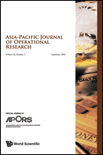
ASIA-PACIFIC JOURNAL OF OPERATIONAL RESEARCH
Catalyzing Collaboration Across the Asia-Pacific Research CommunityASIA-PACIFIC JOURNAL OF OPERATIONAL RESEARCH is a premier academic publication dedicated to the dynamic fields of operational research and management science, published by WORLD SCIENTIFIC PUBL CO PTE LTD. Located in Singapore, this journal has been pivotal in contributing to the dialogue and development of innovative strategies and methodologies within the operational research community since its inception in 1991. With a focus on practical applications and theoretical advancements, it serves as an essential resource for researchers, practitioners, and students seeking to enhance their understanding and expertise in decision sciences. The journal has gained recognition with a Q3 ranking in Management Science and Operations Research in the 2023 category quartiles, underlining its significance in the academic landscape. The Scopus ranking positions it reasonably well, attracting contributions that address both contemporary and emerging challenges in the field. Although the journal operates under a traditional publishing model, it offers vital access to a wealth of high-quality research, making it a go-to source for key findings and methodologies in operational research. Through its rigorous peer-review process, the journal aims to foster collaborative efforts that advance knowledge and practice across the Asia-Pacific region and beyond.

Optimization Letters
Pioneering High-Impact Research in OptimizationOptimization Letters, published by SPRINGER HEIDELBERG, is a leading journal dedicated to the field of optimization, serving as a platform for high-quality research that spans across mathematics, control, and management disciplines. Based in Germany, this journal has been pivotal in advancing the theory and applications of optimization since its inception in 2007, converging a wide scope of innovative methodologies and practical applications up until 2024. With an impressive Scopus ranking placing it in the Q2 category for both Business, Management and Accounting (miscellaneous) and Control and Optimization, it reflects the journal's commitment to disseminating impactful research. Researchers and practitioners benefit from the journal’s rigorous peer-review process, enhancing its credibility within the academic community. Optimization Letters invites contributions that encapsulate novel findings and methodologies that drive forward the understanding and applications of optimization, making it an invaluable resource for those in related fields.